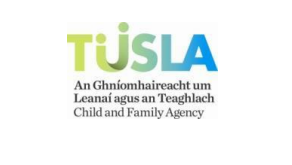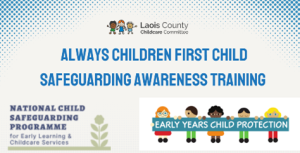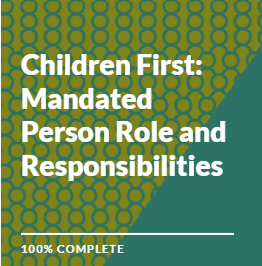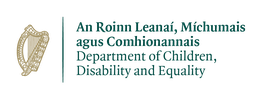 Laois Dedicated Contact Point |
| To Discuss Report a Concern please contact: Tusla Offices, 057 8692567 |
Online Training – universally available to all educators in Early Learning and Childcare Services
 Tusla’s Always Children First eLearning Programme
Tusla’s Always Children First eLearning Programme- Tusla’s Mandated Person eLearning Module
- Tusla’s Designated Liaison Persons (DLP) eLearning Module Part A (This training is not relevant to Childminders)
REQUIREMENT FOR EARLY LEARNING & CARE SERVICES TO DEVELOP/UPDATE A CHILD SAFEGUARDING STATEMENT UNDER THE CHILDREN FIRST ACT, 2015
“Child Safeguarding Statement, Policy, and Procedures: Guidance for Early Learning and Care and School Aged Childcare Services in Ireland” is a resource for ELC and SAC services who are developing, reviewing or updating their Child Safeguarding Statement and associated procedures. This resource is designed to be used by each individual ELC and SAC service and should reflect the individuality of all services. This document was developed by the National Child Safeguarding Programme; Early Learning and Care, in conjunction with Tusla Children First Information and Advice Officers.
What is required in a Child Safeguarding Statement?
The Child Safeguarding Statement specifies the service being provided and the principles and procedures to be observed in order to ensure, as far as practicable, that a child availing of the service is safe from harm.
Why do Early Learning and Care Services need to have a Child Safeguarding Statement?
Under the Children First Act, 2015 all providers of “relevant services” are required to have a Child Safeguarding Statement. Services that meet both criteria below are legally required to have a child Safeguarding Statement:
• An establishment which provides early years services within the meaning of Part VIIA of the Child Care Act 1991
And
• Employs one, or more than one other person whether through contract or otherwise. This means that if your service fits the definition of either a preschool service or a school age service under the Child Care Act 1991, you are required to have a Child Safeguarding Statement
The legal obligation to develop a Child Safeguarding Statement rests with the provider of the relevant service (e.g. the owner or the Board of Management).
When do services need to have a Child Safeguarding Statement?
This has been a legal requirement for existing services since 11th March 2018. New services established after this date have 3 months from opening to put a Child Safeguarding Statement in place.
Do I need to make the Child Safeguarding Statement available?
Yes, the Child Safeguarding Statement must be circulated to all staff members. It must be displayed publicly and made available to parents and guardians, young people, Tusla and members of the public upon request.
I previously had a Child Protection and Welfare Policy. Do I need to develop a Child Safeguarding Statement?
Yes. All early learning and care services are legally required to have a Child Safeguarding Statement and accompanying Child Safeguarding Policies and Procedures. Your existing Child Protection and Welfare Policy will now be called your Child Safeguarding Policies and Procedures and will already contain many of the Policies and Procedures required.
What happens if I don’t have a Child Safeguarding Statement?
In line with the Children First Act 2015, Tusla has established and maintains a register of non-compliance for service providers who fail to provide a copy of the Child Safeguarding Statement to Tusla when requested to do so. Any provider or member of the public can report information (unsolicited information or concerns about a service) to Tusla’s Child Safeguarding Statement Compliance Unit, (CSSCU) regarding a relevant service which does not have a Child Safeguarding Statement in place or has a Child Safeguarding Statement which is not in line with the requirements of the Act.
Tusla’s CSSCU may contact any service which it has information about and may request a copy of the Child Safeguarding Statement at any time. If you fail to provide a copy of the Child Safeguarding Statement to Tusla when requested to do so, steps will be taken in line with the Children First Act, which may result in your service being added to a Register of Non-Compliance which is a publicly held register.
Your Child Safeguarding Statement should include the following information:
- Name of services being provided to children and young people should be – Nature of service and principles to safeguard children from harm: Your Child Safeguarding Statement should outline your principles to safeguard children and the various activities and services you provide to children and young people. It should state your commitment to keep children safe. (There are examples of these principles in the template below)
2. Risk assessment – Your Child Safeguarding Statement must include a written assessment of the risk of ‘harm’ to a child while availing of your service.
Harm in the Children First Act is defined as; • Ill-treatment or neglect of the child in a manner that seriously affects or is likely to seriously affect the child’s health, development or welfare, or • Sexual abuse of the child
All risks identified and stated in the risk assessment must be accompanied by a list of procedures in place to manage those risks. The risk assessment contained in the Child Safeguarding Statement is solely for the purposes of meeting the requirements of the Children First Act, 2015 and will not include risks to children that may occur in relation to general issues of health and safety.
3. Child Safeguarding Policies and Procedures
The Children First Act lists a number of procedures which must be specified in your Child Safeguarding Statement:
• Procedure to manage any risks identified
• Procedure for the management of allegations of abuse or misconduct against workers/volunteers
• Procedure for the safe recruitment and selection of workers and volunteers to work with children
• Procedure for provision of and access to child safeguarding training and information, including the identification of the occurrence of harm
• Procedure for the reporting of child protection or welfare concerns to Tusla
• Procedure for maintaining a list of persons (if any) in the relevant service who are mandated persons
• Procedure for appointing a relevant person
Many of the policies and procedures required in a Child Safeguarding Statement will already be in operation in your service.
For further information on how to develop or update these policies and procedures see – Tusla Child Safeguarding; A Guide of Policy, Procedure and Practice
4. Implementation and Review
Implementation of all Child Safeguarding Policies, Procedures and Practices within your service should involve induction, training and supervision of all staff. Services should have an implementation Plan which outlines; who will be responsible for ensuring the plan is effective. At a minimum, reviews must be carried out every 24 months, or sooner if there has been a material change in relation to any matter to which the statement refers.
Child Safeguarding Statement, Policy, and Procedures: Guidance for Early Learning and Care and School Aged Childcare Services in Ireland” is a resource for ELC and SAC services who are developing, reviewing or updating their Child Safeguarding Statement and associated procedures.This resource is designed to be used by each individual ELC and SAC service and should reflect the individuality of all services.This document was developed by the National Child Safeguarding Programme; Early Learning and Care, in conjunction with Tusla Children First Information and Advice Officers.
Click on the link to download a copy of this resource: http://childsafeguardingelc.ie/resources-publications/
Child Safeguarding Statement ELC TEMPLATE
**************************************************************************************************************************************************************************************

Tusla are pleased to launch a new eLearning module for mandated persons. This eLearning module has been developed to provide information on, and understanding of, the role and responsibilities of mandated persons as outlined in the Children First Act 2015.
The key learning outcomes of the Tusla Children First Mandated Person: Role and Responsibilities eLearning Module for the learner are to;
- Understand a mandated persons legal responsibilities.
- Be aware of the definitions and thresholds for mandated and non-mandated reports.
- Know how to make a report to Tusla.
- Understand mandated assisting and the process involved.
- Understand the mandated persons role to liaise and communicate with Tusla.
This eLearning module will take the participant approximately 60 minutes to complete.
As this eLearning module was developed to continue the learning journey of the mandated person, we recommend that the mandated person firstly complete the Tusla Children First eLearning programme as an introduction to Children First and to the role of the mandated person. The mandated person and all other staff, workers or volunteers may also wish to avail of the Tusla National Approach to Practice – Signs of Safety briefing
If you have any further questions regarding Children First, National Guidance for the Protection and Welfare of Children, or on the Children First Act 2015, please contact the Tusla Children First Information and Advice Service
Click below to start your eLearning – you will be redirected to articulate.com:
https://rise.articulate.com/share/0SLOAecxxd46MwV9GqdfS6toZBwCCHkp#/
**************************************************************************************************************************************************************************************
Early Years Inspectorate Webinars – Governance & Safeguarding
The National Child Safeguarding Committee; Early Learning and Care was set up in 2012 following a number of developments in the Early Years Sector, including the establishment of the Department of Children and Youth Affairs in 2011 and the launch of the updated publication of Children First: National Guidance for the Protection and Welfare of Children, also in 2011. The Children First National Guidance was fully revised and published in 2017 to include reference to the Children First Act 2015. The Committee was developed with the primary aim of addressing the implementation of Children First in the Early Years Sector.
https://childsafeguardingelc.ie/?fbclid=IwAR0Zj_btshFuocrx6R7UY1kHa4yq6-iM7HWgjoAwUe4bHEIY46c_iCX9eQY
Always Children First Child Protection and Welfare Training for Early Years Services
Please be advised that a prerequisite of attending this training is that participants have completed the *Tusla E Learning Children First Programme (see note below).
If any staff in Early Years Services in Laois are interested in a place on this training, please:
- complete the booking form as they are sent to services
- and send a copy of the certificate(s) of e-learning (you should have received this via email upon completion of the e learning) at your earliest convenience to Sinead at s.brophy@laoischildcare.ie
and only then will places be confirmed.
As there is a demand for this training, places will be allocated on a first come first serve basis. Places are limited and priority will also be given to services who have not yet completed any Children First Training.
PLEASE NOTE: Your place will NOT be confirmed, and you will NOT be able to take part in this training unless the e-learning has been complete.
*The Tusla E Learning Children First Programme. This is an online training session which takes approximately 1.5 hours to complete. If you have not already completed the online training please copy this link into your browser and scroll down to the blue box where it states “access the training” http://www.tusla.ie/children-first/children-first-e-learning-programme. You will be required to enter an email address and password. At the end of the session the certificate will be emailed to the email address that you used to access the training.
Child Safeguarding Statement, Policy, and Procedures: Guidance for Early Learning and Care and School Aged Childcare Services in Ireland” is a resource for ELC and SAC services who are developing, reviewing or updating their Child Safeguarding Statement and associated procedures.This resource is designed to be used by each individual ELC and SAC service and should reflect the individuality of all services.This document was developed by the National Child Safeguarding Programme; Early Learning and Care, in conjunction with Tusla Children First Information and Advice Officers.Click on the link to download a copy of this resource: http://childsafeguardingelc.ie/resources-publications/
Tusla_Child_Protection_Handbook2
- Children First 2017 – National Guidance for the Protection and Welfare of Children
- Developing a Child Safeguarding Statement – A Guide for Early Years Services in Ireland Feb 2018
- Responding to and Reporting a Child Protection or Welfare Concern Draft Policy for Early Years Services Feb 2018
- Tusla – A Guide for the Reporting of Child Protection and Welfare Concerns
- Tusla_-_Child_Safeguarding_-_A_Guide_for_Policy,_Procedure_and_Practice
- Tusla-Child_Safeguarding-A Guide for Policy,Procedure and Practice
Mandatory Reporting and Child Safeguarding Statements – New Requirements
There are new legal obligations for early years service providers in the area of child protection and welfare. This article looks at what they are and what they mean for early years services.
Mandatory reporting of child abuse concerns and the requirement to publish a Child Safeguarding Statement are about to become law. From December 11, 2017, when the Children First Act 2015 is fully commenced, there will be new legal requirements in the area of child protection for professionals and services with a key role in the lives of children and families. Early Years services and the people who work in them will have new legal obligations under the act.
Mandated Persons
Mandated persons are people who have contact with children and families and who, because of their qualifications, training and/or employment role, are in a key position to help protect children from harm. All persons carrying on or running a registered pre-school service and all who are employed in them as childcare staff are Mandated Persons. Mandated Persons will have a legal obligation to report child protection concerns over a certain threshold to Tusla.
You are a mandated person if you are:
-A person carrying on a pre-school service within the meaning of Part VIIA of the Child Care Act 1991.
– A childcare staff member employed in a pre-school service within the meaning of Part VIIA of the Child Care Act 1991
New Children First National Guidance
Children First National Guidance for the Protection & Welfare of Children has been updated to include these new provisions and contains important information for professionals working with children and organisations providing services to children. Everyone working in an early years service should read and be familiar with the new Guidance document. All early years services will be provided with a copy over the coming weeks.
The Children First Guidance, the e-learning course and a number of other useful resources can be found at www.tusla.ie
These new requirements are a further, welcome step towards keeping children safe from harm by ensuring that all child protection concerns are passed to Tusla and that organisations providing services to children have taken all the measures necessary to protect the children in their care.
Commencement of Remaining Provisions of the Children First Act 2015
On 2nd October 2017 Minister Katherine Zappone T.D., Minister for Children and Youth Affairs, announced that the remaining provisions of the Children First Act, 2015 will commence on 11th December 2017.
The Act will impose statutory obligations on key professionals to report child protection concerns over a certain threshold to Tusla and on providers of relevant services to children to carry out a comprehensive risk assessment of their services and develop a Child Safeguarding Statement.
The Act includes provisions to:
- Introduce mandatory reporting of child abuse
- Place a legal obligation on organisations providing services to children to prepare and publish a Child Safeguarding Statement.
Early Years Services and the Children First Act, 2015
- All persons carrying on or running a registered early years service and all who are employed in them as childcare staff are Mandated Persons under the Act and will acquire new legal obligations on Dec 11th, 2017.
- Registered early years services who employ at least one other person will have a legal obligation to publish a Child Safeguarding Statement. Services will have 3 months from that date to comply with their obligations in relation to publishing a Child Safeguarding Statement.
Revised Children First Guidance
- The revised Children First Guidance has been published and it includes the provisions of the Children First Act, 2015 it will come into operation on December 11th, 2017.
- Early years services will be provided with a copy of the new guidance over the coming months. The Guidance can be downloaded from www.tusla.ie/children-first/children-first-2017/
*************************************************************************************************************************************************************************************
The Garda Vetting webinar is now available on the National Child Safeguarding Programme website. It can be found under the Early Learning and Care and School Aged Childcare section along with the supporting information.
Below is the direct link to the video on our YouTube channel which will bring you directly to the webinar
**************************************************************************************************************************************************************************************
Recording Child Protection and Welfare Concerns
Early Learning and Care (ELC) and School Aged Childcare (SAC) services must keep written records of all child protection and welfare concerns, including concerns that may not reach the threshold for reporting to Tusla. Services must have a system in place where all workers are aware of how to record all child safeguarding concerns and this should form part of the services’ Child Safeguarding Procedures. Concerns must be recorded in order to identify any potential patterns that may cause concern in relation to safeguarding children. In order to ensure that all relevant information is recorded and appropriate steps are taken, concerns should be recorded on a standardised form that all workers are familiar with.
ELC and SAC services must have a procedure in place which outlines what concerns are recorded, how these concerns are recorded, how they are stored and who has access to them. In order to support ELC and SAC services to do this, the National Child Safeguarding Programme have developed a sample ‘Recording Child Protection and Welfare Concerns Form’.
This form is contained in the National Child Safeguarding Programme’s new publication ‘Child Safeguarding Resource Document – Child Safeguarding Statement, Policy and Procedures; Guidance for Early Learning and Care and School Aged Childcare Services in Ireland’. This resource is available on www.childsafeguardingelc.ie or you can download it here: Recording Concerns Form
The ‘Recording Child Protect and Welfare Concerns Form’ outlines:
- Details of the concern
- Details of the person who raised the concern
- Who was contacted in relation to the concern?
- Details of informal consultation (if any)
- Any actions taken
- Details regarding informing parents
This form is for recording child protection and welfare concerns internally within a service and must not be used to report concerns to Tusla. The Tusla Child Protection and Welfare Report Form must be used to report concerns to Tusla. The Tusla Child Protection and Welfare Report Form should ideally be submitted through the Tusla Web Portal. Where this is not possible, it should be sent by registered post to Tusla Social Work using the Dedicated Contact Point details. Dedicated Contact Points can be found here https://www.tusla.ie/get-in-touch/duty-social-work-teams/
o This form is not mandatory. It is considered best practice for recording all concerns that may arise in services, including those that may not be reported to Tusla as they do not reach the threshold of harm under the Children First Act or Reasonable Grounds for Concern.
- As a first point, child safeguarding concerns must be discussed with the Designated Liaison Person (DLP) in the service.
- The DLP must ensure that the service’s child safeguarding procedures are followed when there are child protection or welfare concerns.
- The DLP must ensure that all concerns are recorded in line with the service’s child safeguarding recording procedure.
- Records must be factual and include details of concerns and any decision and actions that have been taken in relation to the concern(s).
- Confidentiality must be maintained at all times and records of concerns must be stored securely in a separate storage area to other files.
- Concerns must be shared only on a need-to-know basis, in the best interests of the child. This should be managed by the DLP in the service.
- There must be a procedure in place where the DLP regularly reviews child safeguarding concerns. This standardised form should form part of your service’s Child Safeguarding Recording Procedure.
- Information on the Recording Child Protection and Welfare Concerns Form may be shared with Tusla and An Garda Siochana in line with your service’s reporting procedure.
- Records must be stored securely in line with the service’s Record Keeping Procedure and Confidentiality Procedure and the Pre-School Regulations 2016.
Below please find a video on the overview of the national safeguarding programme
Further Online Resources:
- Child Safeguarding Resource Document – Child Safeguarding Statement, Policy and Procedure; Guidance for Early Learning and Care and School Aged Childcare Services in Ireland
- Recording Concerns Form
- National Child Safeguarding Programme Info Blasts
- Tusla You Tube Channel
- Tusla Web Portal
- Tusla Web Portal User Guide
- Tusla Signs of Safety Webinar





